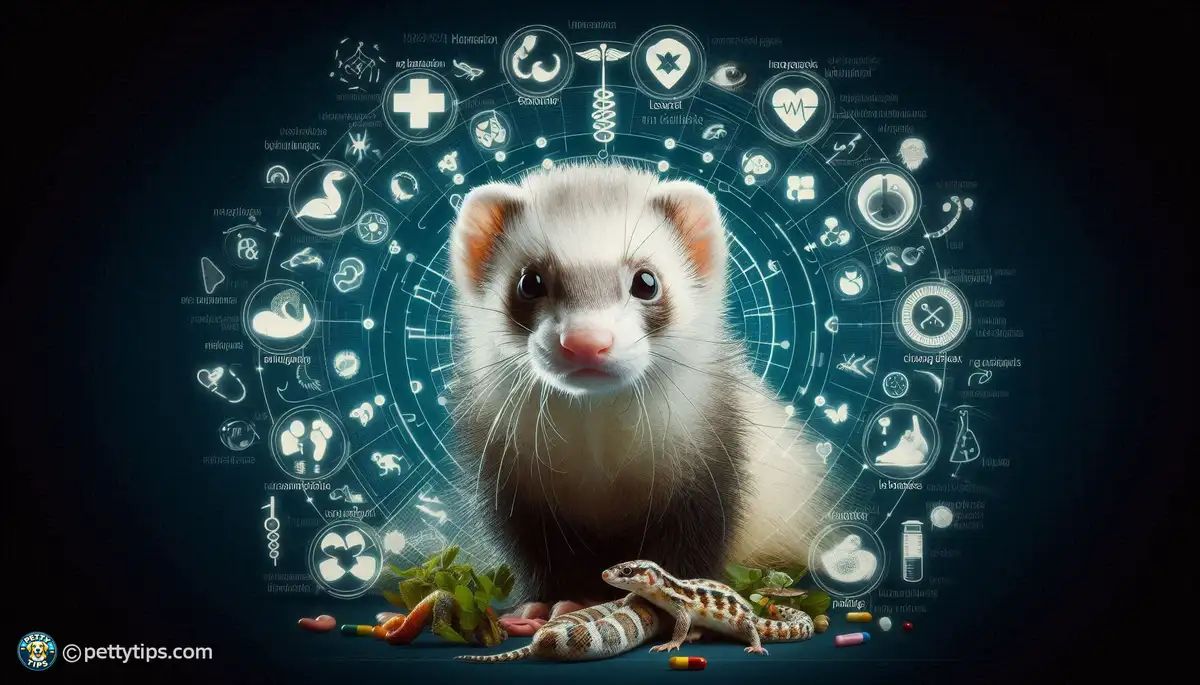
Unconventional Pets: The Fascinating World of Chinchillas
Allison Folsom - Aug 25, 2024 - 8 min read


exotic pets bring an added element of excitement and wonder to our lives. Whether it's a reptile, bird, or small mammal, these unique creatures offer companionship and fascination that can't be matched. However, along with the joys of exotic pet ownership come unique challenges, particularly when it comes to maintaining their health and well-being.
One of the most critical aspects of caring for an exotic pet is staying vigilant about their health. Unlike traditional pets like dogs and cats, exotic animals often hide signs of illness until they are quite advanced. This means that as owners, we need to be proactive in observing and addressing any changes in behavior or appearance that could signal a health issue.
Another key component of exotic pet care is finding a veterinarian who is experienced and knowledgeable in treating these special creatures. Not all vets have expertise in exotic animal care, so it's essential to do your research and find a practitioner who has experience with the specific type of exotic pet you own. Building a relationship with a vet who understands the unique needs of your pet is invaluable for maintaining their health and addressing any issues that may arise.
One of the first signs that something may be amiss with your exotic pet is a change in their appetite or eating habits. Whether they suddenly stop eating altogether or show a significant decrease in appetite, any deviation from their normal behavior should be cause for concern. Additionally, be on the lookout for changes in the way they eat, such as difficulty chewing or swallowing, which could indicate dental issues or other health problems.
Monitoring your exotic pet's droppings and urine can provide valuable insights into their health. Any changes in the color, consistency, or frequency of their waste could indicate digestive issues, dehydration, or other underlying problems. It's essential to familiarize yourself with what is normal for your pet so that you can quickly identify any abnormalities and seek veterinary care if necessary.
respiratory issues are common in many exotic pets, particularly those kept in environments with inadequate ventilation or improper temperature regulation. Signs of respiratory distress may include wheezing, labored breathing, or discharge from the nose or mouth. These symptoms can indicate respiratory infections or other respiratory conditions that require prompt treatment by a veterinarian familiar with exotic animal medicine.
Changes in your exotic pet's activity levels can be indicative of underlying health issues. While some animals may naturally be less active than others, a sudden increase or decrease in activity could signal pain, illness, or discomfort. Pay attention to any lethargy or reluctance to move, as well as excessive or frantic activity that is out of character for your pet.
Exotic pets, like all animals, have their own unique personalities and behaviors. However, sudden aggression or other unusual behavior should not be ignored. It could be a sign of pain, fear, or stress, all of which warrant further investigation by a veterinarian. Additionally, any changes in social behavior or interactions with other pets or humans should be noted and evaluated for potential health issues.
Some exotic pets, particularly birds and small mammals, may engage in self-mutilation or excessive grooming when they are stressed or unwell. This behavior can manifest as feather-plucking in birds or excessive licking or scratching in mammals. If you notice your pet engaging in these behaviors, it's essential to address the underlying cause, which may include medical issues, environmental stressors, or behavioral problems.
The skin is the body's largest organ and can provide valuable clues about your exotic pet's overall health. Any changes in skin color, texture, or appearance should be investigated further. This could include redness, flakiness, lumps or bumps, or lesions. These symptoms could indicate skin infections, parasites, allergies, or other dermatological issues that require treatment.
Hair loss or bald patches in your exotic pet's coat can be a sign of various health problems, including nutritional deficiencies, parasitic infestations, hormonal imbalances, or skin infections. It's essential to monitor your pet's coat for any changes and consult with a veterinarian if you notice excessive shedding or bald spots. Depending on the underlying cause, treatment may include dietary adjustments, medication, or topical treatments.
Persistent itching or scratching can be indicative of skin irritation, allergies, parasites, or other underlying health issues. While occasional scratching is normal, excessive or obsessive scratching should be evaluated by a veterinarian. They can determine the underlying cause of your pet's discomfort and recommend appropriate treatment to alleviate their symptoms and improve their quality of life.
Digestive issues such as vomiting or diarrhea are common in exotic pets and can be caused by a variety of factors, including dietary indiscretion, infections, parasites, or underlying health conditions. It's essential to monitor your pet's bowel movements and seek veterinary care if you notice any abnormalities. Depending on the severity and duration of their symptoms, treatment may include dietary changes, medication, or supportive care to address dehydration or electrolyte imbalances.
A bloated or distended abdomen in an exotic pet can be a sign of serious health issues such as gastrointestinal obstruction, organ enlargement, or fluid accumulation. If you notice your pet's abdomen appears swollen or distended, it's crucial to seek immediate veterinary attention. Delaying treatment could exacerbate their condition and lead to serious complications.
Any changes in your exotic pet's eating or drinking habits should be taken seriously, as they could indicate underlying digestive issues. This could include a sudden increase or decrease in appetite, difficulty swallowing, or reluctance to eat or drink altogether. It's essential to monitor your pet's food and water intake closely and consult with a veterinarian if you notice any changes that persist for more than a day or two.